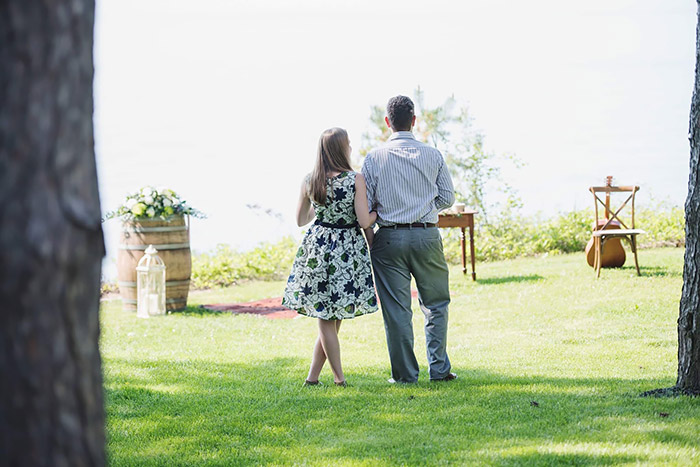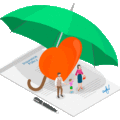
Job losses and temporary layoffs have been widespread recently in Canada and somewhat predictable. For example, employment hours have been slashed in sectors such as the airline and travel industry, along with bars, restaurants and cinemas.
While it hasn’t been as surprising in these instances – it also appears that almost no one is completely immune to the threat of layoffs at this time.
The Importance of an Emergency Fund
This unpredictability in employment has brought to the forefront, the importance of managing household spending, having an emergency fund and an emergency plan, in case of a job loss.
Our fellow Twitter user, “Calm ‘n Cents” had the unfortunate experience of encountering an unexpected job loss recently.
Further down in this piece, we discuss with him how having an emergency fund made things much more palatable. How planned savings allowed for his family to breathe and take a step back. How it provided him with the luxury of time to reflect and assess options going forward, rather than panic and wonder how the next bill would be paid.
(Click here to skip to the Interview)
Have an Emergency Plan & Be Comfortable with it
It’s clear that an emergency fund is worthwhile having, but have you taken the time to actually plan for realistic scenarios? It’s great to have a large sum of money sitting somewhere and available in case of emergency, but it’s even better to have a plan to go with it. Here are some questions you might consider asking yourself when planning for an unexpected event:
- How much money do you actually need to save?
- Is your savings target based on a specific length of time in relation to covering expenses, or a particular dollar amount?
- Will this amount sustain your lifestyle while getting through the emergency, or do you plan to cut your budget back?
- Have you planned for various types of emergencies? These can affect the amount of money you may require.
- Examples might be a job loss, a debilitating injury, an unexpected car repair, a family pet emergency, legal issues… etc.
- Will your expenses be the same in various situations, or will they increase/decrease?
These are all important considerations that may help you in formulating a plan to determine the amount or length of time you wish to save.
Emergency Funds of All Varieties
There are a few schools of thought on where to keep your emergency fund. Your own personal financial situation should have some bearing on this decision. Below are some examples of emergency fund possibilities.
Cash or High-Interest Savings Account
This is definitely your safest option and what I would recommend for anyone who doesn’t have an emergency fund now and is just starting to build their wealth. You want your funds to be easily accessible and if you can make a little bit of interest at the same time, it’s a great option. You also need to be disciplined and leave your emergency fund alone – don’t turn it into a vacation or reno fund, it’s for emergencies!
Short Term Guaranteed Investment Certificate
If you or your partner don’t trust yourselves to leave a big chunk of cash alone or are prone to spending money, consider something like a short-term GIC. You can lock your savings in at a reasonable interest rate, and for a period as short as 30 to 60 days. While your money may not be immediately accessible, you will actually have the funds available, so if you need to borrow, you can pay back a loan or credit card. Some people just can’t help themselves with a large cash balance, it can be tempting to spend it – so if that’s you, consider locking your emergency money away from yourself!
HELOC or Line of Credit
Some really motivated individuals are determined to put all the money they can down on their mortgage to eliminate that debt as soon as possible. If you have some decent equity in your home and have a Home Equity Line of Credit or other low-interest Line of Credit, these can potentially be an option for an emergency fund. You want to be sure you aren’t paying high rates of interest and have a reasonable expectation that you will be able to pay your loan back quickly or roll it back into your mortgage, which you can continue paying off regularly.
Investment Accounts
The opportunity cost of money sitting in a low-interest savings account can be a point of contention for some individuals. If that’s the case and you have a decent amount invested in the stock market or other fairly liquid assets already, you may choose to use this money as your emergency fund. While this can be a valid option if the need arises, be cautious. You can’t time the market, nor can you predict when an emergency will surface. The last thing you want to do is be forced to withdraw a good chunk of your investments when the market is down.
Credit Cards
Avoid at all costs! Credit cards have some of the highest interest rates around and is one of the worst ways to borrow money. Unless you are using your card to earn points or just to temporarily to access cash, steer clear of this option. If you do use a card, be sure you can pay off your full balance before the interest kicks in.
What’s good for one person isn’t good for everyone
All of the options above will depend on your personal financial situation and can vary in suitability to a degree based on your appetite for risk and your emotional intelligence when it comes to saving and investing. You will also want to consider, which of these options are actually available to you.
- Do you trust yourself and your spouse to leave a bunch of cash sitting in an account, or will it turn into a vacation fund?
- How disciplined are you with your investments, are you leveraged already?
- Do you have access to credit, how much and at what rates?
- Do you have a plan or the ability to repay a short-term loan and to rebuild your emergency fund?
- Will you be able to deal with a long-term job loss, injury or illness?
- Do you have any sort of insurance to mitigate these risks?
Insurance
The topic of insurance could take up an article of its’ own. So briefly, it’s something you want to assess based on your own personal situation and figure out how your insurance will fit in with your emergency plan. Consider the following options:
- Mortgage Insurance /Disability Insurance – in case of long-term injury or illness, can you cover your mortgage payments?
- Life Insurance – do you have coverage in case there is a death in the family and you lose an income or can no longer meet all of your financial obligations on your own
- Property Insurance – ensure your property insurance covers major repairs. A new roof or a basement flood can be a small emergency.
- Liability Insurance – if you run a business, in case of an accident, emergency or legal problems, you want to ensure your assets are protected
Insurance can of course be an added expense to your budget, hindering your savings rate, but the alternative could be much worse. Also, keep in mind that as you accumulate wealth, passive income and build equity in your home, you can always dial back the amount of insurance you are purchasing.
If your home is paid off, you don’t need mortgage insurance. If you are living off investment income or supplementing your employment income with it, you may not need disability insurance.
Whatever your situation is and whatever you decide, I will always advocate that having a cash emergency fund is a solid option. Not only is it there if you ever need it, but it can simply bring peace of mind, knowing that you won’t be left scrambling for money in an already emotional situation.
In Case of Catastrophe!
Life insurance should be something you factor into your emergency plan. While this article examines a job loss scenario involving one individual, there are many emergencies that can be far worse.
Take for example when a family member passes away. For most people, having additional money or income available would be essential in order to maintain their current standard of living. This is particularly true for families with two working adults and dependents. Do not leave this to chance!
Life insurance should be part of your emergency plan and is a no-brainer if you have children, it’s borderline irresponsible not to have it. However, if you don’t have life insurance yet, don’t fret – you’re on the right path simply by learning about the options. In fact, I have a piece with more details on How to Shop for Life Insurance as a good starting point!
It’s also much easier these days to get a simple quote on Life Insurance. You don’t have to meet with a broker or go down to your local bank branch, in fact, you can do it online. I’d recommend a website like PolicyMe, that provides insurance advice and an instant quote. You can fill out your personal details and they will recommend both the type and amount of insurance you should consider getting.
Once you have been given a recommendation for insurance coverage, PolicyMe allows you to apply and potentially receive an approval decision instantly. This cuts down the traditional life insurance application time from weeks to potentially just 15 minutes.
Personalized quotes take only a few minutes. Life insurance should be an essential box you tick off when creating your emergency plan – so take 5 minutes and at least get a quote and a sense of what you should budget for.
The interview below examines a real-life situation where an emergency fund demonstrates its merits and proves its value, bringing not only peace of mind but perspective on a difficult situation – rather than panic and uncertainty.
One Family’s Story

I was sorry to hear about your job loss, can you tell me a little about yourself and your family situation?
My wife and I are in our 30s (35 and 32). We were DINKs (double income no kids) with 2 cats until I lost my job unexpectedly in September. I worked in government and was a mid-level manager with 3 years of experience in the position and 6 years professionally. Currently, we are SINKs (single income no kids) while we determine the best next steps for us. (Hopefully, we don’t SINK, lol).
Hopefully not! Did you have a specific emergency plan and budget or an emergency fund already saved?
Prior to losing my job, we had established an emergency fund and had been running with 4-4½ months of expenses in the fund. We also recognized that, in a job-loss scenario, there might be a lag period where we could still receive some income from the defunct position (a final paycheque, perhaps). If that were to occur, it could allow us to immediately increase our emergency fund to a minimum of 6 months if a job loss scenario arose.
It sounds like you were well prepared. When you first considered the idea of an emergency fund, was there a certain length of time or specific dollar value you had targeted?
Kind of answered above. When we were starting out in our careers, we aimed to have a minimum of 4 months in the emergency fund. Over the last few years, the emergency fund has varied in size between 4 and 8 months. Currently, we are looking to build it up to 11-12 months.
Wow, that’s a sizeable cushion to have! What were the biggest challenges for you in saving up an emergency fund, did it take you a long time to reach that goal?
The biggest challenge for saving up an emergency fund is getting to the point where you have a decent amount in your emergency fund, regardless of what that is for you, that you can navigate an emergency without taking on debt. This is especially an issue for larger families and/or low-income earners because the progress you make will be slow and steady. The key is to keep at it.
We were lucky. When we were starting out in grad school, we had external scholarships that we made the goal of saving so we designed our budget in a manner where we didn’t touch them at all. We also incorporated a contingency line in our budget for any emergencies and rolled that into the emergency fund if we didn’t use it after a few months. Because of this approach, we were able to establish a 4-month emergency fund (~$12,000) fairly fast.
Getting back to what started all of this, were you surprised to be let go from your job when it happened? Or was this something you had planned for and thought might be a possibility with your role at work?
I was very surprised to be let go from my job. Government jobs are generally fairly secure so to have it pulled away was a shock, but the emergency fund and our approach to our finances (i.e. low expenses and the ability to save quickly) insulates us from major financial turmoil.
Has this sort of thing ever happened to you before?
Yes, it has happened before. In 2016, I was a contract employee and my contract was not renewed. Also in 2016, my wife was advised her job was being repackaged and moved to a different organization. She had to re-apply for her own job and wasn’t the chosen candidate for the position. I think these experiences definitely helped to inform our financial choices. We knew how we weathered those hiccups and used them to game plan if it were to happen again.
Did you have to cut back your spending or reduce your household budget after the layoff?
We dialed back a little bit on reflex because that’s what we did in 2016 when we both lost our jobs at different times. But, it wasn’t necessary this time.
You were obviously well prepared from experience. What are the most important things that you believe helped you prepare for such an emergency? Simply having an emergency fund? Having lower expenses? Other? Can you talk about what you think made your job loss a little easier to digest?
There are definitely a few things that have helped us in this time.
- The Emergency Fund is Big. We know we have a reserve and aren’t stressing about having our family income cut by 50%.
- Other Income Sources. My wife still has her job and benefits and, because we spend so little, we can continue to save on her income alone. This reduces the stress even more.
- We have no debt. No mortgage or anything. This is important because it keeps our expenses very low. Lower expenses means our emergency fund goes farther and is easier to reinforce. We also have complete flexibility to apportion our money on a monthly basis. If we had debt, we’d have lenders dictating where portions of our income goes each month and we didn’t want that. We wanted the security of not being beholden to any institution, and it has paid off.
- We have also eliminated lifestyle creep. We started doing this in 2013 when we moved in together. We set a budget and a lifestyle then, and sought to keep spending to that level. 7 years later, we still live like grad students and spend 40% less each month now than we did then because of it. It’s allowed us to turn every pay raise into increased savings and has allowed us to live and save on a fraction of one income.
- We had been through job loss before and had come out the other side unscathed. Having personal experience means you can take what worked and what didn’t and plan better for the next instance if it happens again.
These 5 points really made things easier to digest because we knew our financial situation was strong; we had been here before; and, we knew we were able to keep the saving and investing engine rolling through low expenses and our ample emergency fund.
Have you heard from any of your co-workers since leaving work? If not, were you surprised?
I have spoken to 3 coworkers since I was let go. This is out of the 40+ people I would interact with regularly. It wasn’t a shock. Your coworkers and employees and bosses are acquaintances to play nice with to do a job. Often, they will not become friends and that’s okay. Making friends isn’t the primary intent of employment; it’s income.
That’s true, I think most people are there for the paycheque. What is your plan to get back to work? Do you foresee any changes to your lifestyle going forward?
Currently, I am taking a very relaxed approach to finding new employment. I know my skillset is specialized so finding new work in the rural area in which we live will not be a quick thing. I am combing job pages every few days and have the plan to apply for a couple of jobs soon, but if nothing comes of it, I am okay with that as I have a few personal projects I have started to put more effort into with all of this extra spare time.
As for lifestyle, there has been some serious discussion on exactly that. Previously, we were ready to work until we had $450,000 in investments before Coast FIing. Now, and after a full review of our finances, we have recognized that we can take it even slower and start SlowFIing earlier. It’s a serious consideration right now.
What are you doing with your free time these days in the interim?
With all of this extra free time, I have been reading and writing more poetry and fiction, and focusing a bit more on larger social media exposure for Calm ‘n Cents. I have also been walking more and have started to lift weights again. If I have been given this surprise change to my life, I might as well view it as an opportunity and make the most of it.
I wanted to thank Calm ‘n Cents very much for taking the time to chat, and to wish his family the best of luck in their future endeavours!
Emergency funds are clearly an important piece of your financial picture. Simply having one, even if it’s not yet at your target level, is a huge asset when faced with a bad situation.
Not only does it give you a bit of a financial cushion when an emergency happens, but it can also help your mental well-being and how you react to such a scenario. We all face a crisis, small or large at some point in our lives, not having to worry about the financial aspect of such an event is a huge burden lifted.
A job loss is always difficult, emergency fund or not. In the case of Calm ‘n Cents, it seems it’s allowed his family to absorb the blow much more easily and use the time off work to reflect on life and opportunities, rather than to panic and worry about what lies ahead.
You can follow Calm ‘n Cents on Twitter.







Wow, I had no idea about Calm ‘n Cents losing his job. I’m sorry to hear that, but it sounds like he’s in a very good financial place. It seems they were very prepared and planned ahead, based on their past experience.
His story shows how important it is to have an emergency plan, and not just a random emergency fund! The tips and info you laid out at the beginning of the post are very well thought out. Hopefully your readers will take it to heart and plan ahead, before a true emergency hits.
Thanks Chrissy, I agree wholeheartedly. We’ve been fortunate enough to avoid this situation in our family, but the advent of COVID-19 really made me give our plan a second look. I really believe an emergency fund can be as much of a mental support as it is a financial support during bad times.